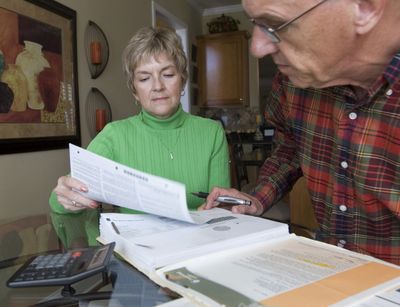Don’t look! It’s your 401(k) statement

To peek or not to peek, that is the question.
Whether ’tis nobler to suffer the slings and arrows of a sinking 401(k), or toss that quarterly statement straight in the trash?
During this economic crisis, with stocks on a scary roller-coaster ride, there seem to be two kinds of people: Those who are following the peaks and plunges of their investments and those who simply refuse to look.
Darla Flack, a 39-year-old mther in northwest Iowa, is in the latter camp.
“I’m not looking because I know better,” Flack says. “It’ll come back.”
In fact, instead of taking a vacation this year, Flack and her husband decided to invest that money in the market.
For now, though, financial statements go into a file folder, unopened.
“You start to lose faith and I don’t think that’s a good thing,” she says. “I don’t think you can panic right now.”
It’s safe to say Joan Statler feels panicked. Statler, 62, is director of the Van Matre Senior Center in Mountain Home, Ark., and hopes to retire in a few years.
Looking at her last 401(k) report left her feeling ill — and that was before the most recent market crash.
“Right now, I’m just like, ‘Oh my God,’ ” Statler says. “I can’t even stand to think I probably have nothing. … I feel pretty helpless and I feel sick about what we’re leaving to my granddaughters.”
Not long before 9/11 and the ensuing stock-market dive, Statler and her husband paid stiff penalties to take money out of their retirement account to build a house.
“My boss was furious,” she says. “My friends told me I was crazy. They lost a bunch and I still have my roof and my well.”
And now she’s wishing she’d taken her money out of the market before this crisis.
“I don’t know if it’ll ever come back,” Statler says.
You should not let your emotions guide your economic decisions, says Jean Stezfand, director of financial security for AARP. So for some people, keeping quarterly financial statements sealed tight might not be a bad idea.
“Looking and panicking and starting to pull your money out of the bank is not the best thing to do,” Stezfand says. “You have to know yourself — if you’re going to get really scared, if you’re really going to get panicked. If there is a time to bury your head, maybe this is a good time to do so.”
Minneapolis-based consultant Doug Lennick urges investors to be reflective, and not reflexive, about the current state of the market, especially when those financial updates arrive in the mail.
“If you got scared by your statement, you don’t want the quick response,” says Lennick, whose Lennick Aberman Group specializes in behavioral advice. “You want to be reflective and think about the big picture.”
To do that, he says, you need to learn the four Rs. First, recognize how stress affects your body. Then, reflect on your personal values and what you care about in the long-term. Next, he says, reframe how you think of the situation and consider positive aspects of your life. And finally, decide how to respond.
Judy Dienell and her husband, Bob, both 66, have followed a similar thought process as they assess their retirement reports, she says.
“You look at it every day and you’ve lost a lot,” says Judy Dienell, who lives in a 55-and-older community near Atlanta. “But over the years, it’s up and down. I don’t worry so much.”
For those at or near retirement, Stezfand says, “you want to pretend you’re younger and give yourself a longer time frame to recoup from the market downturn.”
That means living on other sources of income, such as Social Security, before dipping into that retirement fund.
Mike Cassidy, a 49-year-old business columnist with The Mercury News in San Jose, Calif., dedicated a column earlier this month to the fact that he’s not looking at his ever-dwindling 401(k) statement – which he now calls his “201(k).”
He says he received a few scolding letters from readers, criticizing him for not following the state of his finances. But an equal number commiserated with his feeling of helplessness.
“I’m not even going to open it,” Cassidy wrote. “I’m just going to shove it in a drawer. I won’t check my progress — or lack of it — on the Web. My online account is off-limits. I’ve already seen the accounting of my assets in my nightmares: One hot plate. One can of Alpo.
“This, my friends, is the time for denial.”
Whether you choose Cassidy’s route or go ahead and open that statement is up to you and your emotions, of course. As Shakespeare says, “To thine own self be true.”